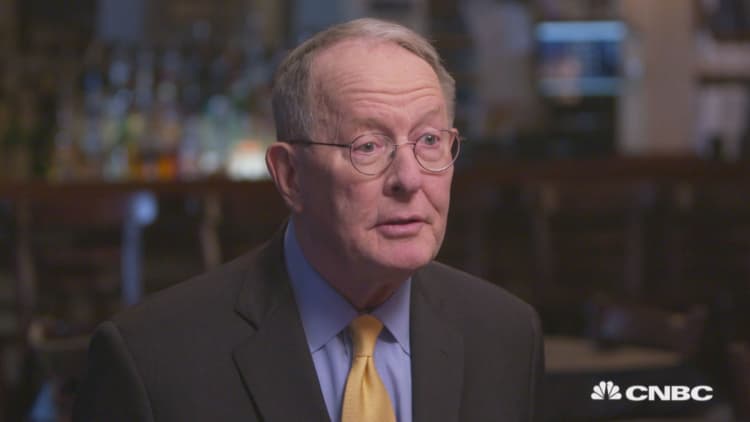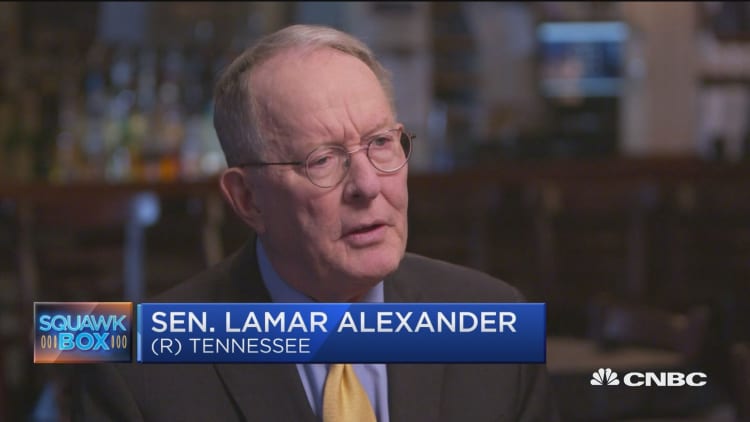
"Speakeasy with John Harwood" is now available as a podcast. Subscribe on iTunes and listen to Harwood's extended conversations with political decision-makers.
Sen. Lamar Alexander's 50-year career in politics spans every top job short of the presidency. He began as an aide to Sen. Howard Baker, worked in the Nixon White House and served two terms as governor of Tennessee with an emphasis on education and economic development.
After a stint as president of the University of Tennessee, he became Education secretary under President George H.W. Bush. Then came two unsuccessful campaigns for president in his own right, followed by his election in 2002 to the U.S. Senate.
Now 77, Alexander has earned a reputation for seriousness, diligence and pragmatism. A few years ago, he quit his post as the third-ranking member of the Senate Republican Leadership to gain more latitude for compromise with Democrats. Now the deal he has struck with Democratic counterpart Sen. Patty Murray to stabilize Obamacare marketplaces has become a key bargaining chip in the Senate tax-cut debate.
He sat down in Nashville's Bluebird Cafe, the songwriter's haven where Taylor Swift was discovered, to discuss the quest for successful governance in President Donald Trump's Washington. What follows is a condensed, edited transcript of their conversation.
CNBC's John Harwood: When I think of you, your career, what you've done, beginning when you were a student, a young aide in the White House, governor, Cabinet secretary, senator, I think of seriousness of purpose, reason, rationality, problem solving.
Alexander: Yeah.
Harwood: And sometimes when you look at the Washington we live in right now, not just the Congress, but in this White House, it's the opposite of that.
Alexander: That's true. And that's not what government's supposed to do. You know, if all I want to do is make a speech, or shout, I'd go to a street corner or buy a radio station. I want to get a result. And that's harder to do today, because the extremes are polarizing.
Harwood: A few years ago, we talked when you had made the decision to quit the Republican leadership. You said at that time that you felt you would be freer to solve problems if you were not in the leadership. How's that worked out?
Alexander: It has done that. I mean, fixing No Child Left Behind, that took a few years. President Obama said it was a Christmas miracle when we got it done. The smaller bill that Sen. Murray of Washington state and I worked out to try to stabilize the individual insurance market, bring premiums down, avoid chaos, which we hope the president will sign. So ...
Harwood: Is that going to work?
Alexander: I believe it will. I think the country could use a bipartisan solution on health care, and it wouldn't hurt the president and Congress one bit to enact one.
Harwood: President Donald Trump seems, in many ways, to be a polar opposite from you. You have a president who doesn't give any evidence of knowing what's in the bill that you guys have worked out, or caring much about the content of the bill. Sometimes he says, "Let's do it," sometimes he says, "Let's don't." He'll tweet one thing, tweet another thing. How do you navigate that process?
Alexander: Lamar Alexander isn't president. I tried to be, and the people chose Donald Trump at a different time. So the president called me in this case, and he said, "I think we need a bipartisan solution on health care, so people aren't hurt for the next couple of years. Why don't you work with Sen. Murray, and see if you can do one?"
We've done our job, it's sitting there at the White House, wrapped up in a nice package.
Harwood: Well, what about fellow Republicans in the House and in the Senate?
Alexander: I think if the president supports it, it'll be a part of the end-of-the-year package. We see premiums going through the roof. So, for the next two years, we ought to be able to agree that we're going to stabilize that. I mean, we're sitting here, in the Bluebird Cafe. Most songwriters don't have health insurance, because they can't afford it. If they do have it, in Tennessee, their premiums went up 176 percent in the last four years, and 58 percent this next year. So, what this little bill would do is take those premiums down, not up.
Harwood: And so does that mean the entire game for you, in particular, not so much Sen. Murray, is to be the last person to talk to President Trump, to get him to go like this [thumb-up], instead of go like that [thumb-down]?
Alexander: We're going to say, "Mr. President, you asked us to do this. You don't want chaos, neither do we. Sign it, take some credit for it, and give the American people a bipartisan win. I think they'll like it."
Harwood: Let me talk a little bit about your party. And I was looking back at the causes that you've advanced over your career. From when you were a student, civil rights, ...
Alexander: Right.
Harwood: ... education, economic development. What do you think about where your party is headed, and the set of priorities that the party is embodying right now?
Alexander: On taxes, I think we're right where we ought to be. It's a middle-income tax cut. People in every category get some lower taxes. But more importantly, it'll take handcuffs off job creators and allow them to grow. Cutting the corporate rate from 35 percent to 20 percent, allowing you to expense the things you buy immediately, that doesn't sound like front-page news. But what it should do in Tennessee is raise family incomes. Ninety percent of the people will use the standard deduction. The child-care tax credit will be doubled. And there should be more good-paying jobs, more competition for employees, which means wages go up.
Harwood: What about the argument from Marco Rubio and Mike Lee, that if you gave a little bit less money for people at the top, you could make a larger child credit, and you could make it refundable against the payroll tax for people who don't have income-tax liability?
Alexander: It's hard to take much more from people at the top, when 10 percent of the people pay 70 percent of the taxes. What you really need is a growing economy that produces more revenues. That's more money for the government, and that's more money in your wallet.
Harwood: We already have substantial deficits. We're already on track to have $10 trillion in deficits on the next 10 years. You've got more and more people coming on Medicare and Social Security. What gives afterwards?
Alexander: Nobody likes to cut entitlements. But I think the Republican Party should, and always has said, we want to reduce the growth of government, increase the amount of money in your pocketbook, and reduce the federal debt. That, I think, is a winning formula.
Harwood: When we had that conversation six years ago, when you left the leadership, you told me roads and bridges, national laboratories, college scholarships, ...
Alexander: Right.
Harwood: ... all those things should be part of our agenda and our economic program. We're not hearing much talk about that. You look at the budget priorities, where the Trump administration's budget has gone. You haven't seen anything on infrastructure this year.
Alexander: Well, but if you look at what the Republican Congress has done, let's just take that. We've increased spending for biomedical research, for the National Institutes of Health, more than any other Congress in many, many years. Now, the budget didn't, but we don't pay attention to presidents' budgets, whether they're President Trump, or President Obama.
Harwood: So, what you guys have done on the budget in the Congress is more important than the things that the administration has been saying? Because that sends a signal.
Alexander: Well, it sends a signal. Everybody pays attention to it, but it doesn't turn into anything. What we do becomes the law.
Harwood: Steve Bannon, he's going after every Republican who supports Mitch McConnell, with one or two exceptions.
Alexander: Yeah.
Harwood: What is that all about? What is he after? What do you think of that situation?
Alexander: I wish he'd go after Democrats. I don't see how defeating Republicans helps advance a conservative agenda. I think all it does is create an opportunity for Democrats to take back over and advance the Obama agenda, or the Clinton agenda, or the Bernie Sanders agenda.
Harwood: So, why is the president's former campaign chief executive and top strategist doing this?
Alexander: Beats me.
Harwood: Now, Steve Bannon says that he's going after the people who are part of the global establishment clique, who look down on the blue-collar Trump voters. So, how do you plead on that?
Alexander: I don't know what he's talking about.
Harwood: Are you a globalist?
Alexander: I'm sitting in the Bluebird Cafe, 40 miles from the largest auto plant in North America. It's called Nissan. And it helped to attract 1,000 auto suppliers to Tennessee, raised our family incomes, made us richer. I went to Japan to help get it. I'm interested in us being a part of the world. That's why I think the president's gotten bad advice from Mr. Bannon or others about NAFTA. Argue with China, argue with Japan, leave NAFTA alone. Mexico and China have helped make us rich in Tennessee — richer.
Harwood: Why do you think the president doesn't get this?
Alexander: He gets advice from different people, and so I'm giving him other advice.
Harwood: When I did that story, when you left the leadership, I talked to your old advisor Mike Murphy. He said, "You know, if voters wanted politicians with guts, they'd elect them. But more often than not, they vote for the opposite." What do you think of that? Is that true?
Alexander: I think the rewards today are for people who do stand up, and stand on their principles, and don't work together to get a result. I think that's where the rewards are. But I think the satisfaction of public service is getting a result, is lowering the songwriter's health care premium.
Harwood: Is there any prospect, as you see it, that the fashions of the country change so that that satisfaction gets rewarded more than it is right now?
Alexander: Well, maybe. We'll see. I get up in the morning, and try to do something to help the country, and go to bed at night thinking I have, that I've done a good day's work. And in the end, that's what I should be doing.
Read more excerpts of Lamar Alexander's Speakeasy here.
WATCH: Sen. Lamar Alexander: Nobody likes to cut entitlements but the Republicans should



